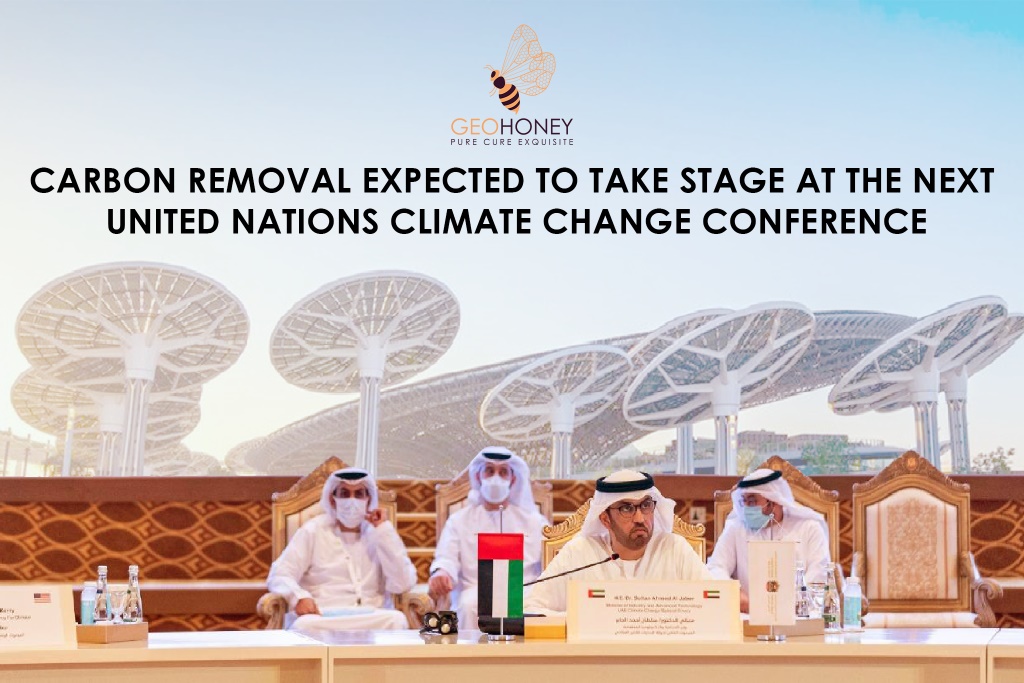- Tokyo: 08:06
- Singapore: 07:06
- Dubai: 03:06
- London: 23:06
- New York: 18:06
Carbon Removal Expected To Take Stage At The Next United Nations Climate Change Conference

Despite the fact that the United Arab Emirates (UAE), the host of the upcoming United Nations climate change negotiations in Dubai, has called for the phase-out of carbon emissions while continuing to produce fossil fuels, a long-time observer of such talks predicts that carbon sequestration will take centre stage in December.
Carbon sequestration, or the technique of capturing and storing atmospheric carbon dioxide (CO2), will be the focus of COP28, according to Professor Robert Stavins, who delivered the inaugural Albert Winsemius Lecture at Nanyang Technological University (NTU) last Tuesday.
"It implies, I believe, renewed attention to carbon capture and storage, carbon capture and utilisation, as well as direct carbon removal from the atmosphere, which is extensive in the UAE, as well as geoengineering such as solar radiation management."
"Now, if that happens, it would be controversial," noted Prof Stavins, a Harvard environmental economist who has participated in global climate summits for the past 15 years. Before the COP28 discussions, there were major divides among states about how to address global warming.
Some wealthy Western governments and climate-affected island nations are banding together to phase out fossil fuels, while resource-rich countries such as the UAE have advocated for the continued drilling and mining of fossil fuels that have caused climate change.
However, carbon capture, utilisation, and storage (CCUS) technologies, which address CO2 emissions from power production and industrial processes driven by fossil fuels or biomass, have made little development, according to the International Energy Agency (IEA). There are already 35 commercial capture facilities in operation worldwide, with none in Singapore.
The aggregate yearly CO2 capture capacity of around 45 million tonnes is a small fraction of the world's 36.8 billion tonnes produced in 2022. The IEA also stated that plans are in place to establish further CCUS projects. Since January 2020, more than ten projects in Indonesia, Malaysia, and Thailand have been announced, with a combined capture capacity of roughly 15 million tonnes of CO2 per year by 2030.
Prof Stavins told The Straits Times that in the cost-benefit analysis on naturally sequestering carbon by planting trees in forestation efforts, "while biological sequestration of carbon could be more cost-effective than other forms of emission mitigation in many cases, arable land for food production would be sacrificed as trees are planted instead, and this could gradually tip the balance towards increased cost."
This comes as the Ukraine war, now in its second year, has kept global food prices higher than usual, even after falling from record highs in early 2022, according to a March study from the International Monetary Fund.
Companies are increasingly using carbon credits to offset their emissions, and countries can meet their own emissions reduction targets by sponsoring carbon projects in other countries. However, several forest-based carbon programmes have been chastised for claiming to have avoided emissions when there was no real threat of deforestation.
Prof Stavins, who wrote the Intergovernmental Panel on Climate Change's second, third, and fifth assessment reports, raised the issue of carbon credit quality at a discussion last Wednesday at NTU.
"I am extremely sceptical of forestry credits because we don't know if we're getting anything extra from them, and the comparison is made with a hypothetical of what would have happened otherwise." And that is a hypothetical that is both unnoticed and unobservable. That is a problem." He cited the European Union as a big purchaser of credits, primarily from China and Brazil.
"As a result of the credit, the EU was able to avoid reducing emissions as they would have otherwise." However, it is unclear whether emissions reductions went beyond what would have occurred in those countries," he noted. "In other words, as a result of the credit, your emissions increased." So that was a major issue."
Singapore is home to the Climate Action Data Trust, a World Bank-backed carbon credit data sharing network that, among other things, helps address the issue of double counting and assist in scaling up carbon markets.
Source: straitstimes.com




We believe that if this CARBON SEQUESTRATION will be executed properly it would be great news for all over the world, because of the long-suffering due to this climate change effect, there are still ways to reduce it.